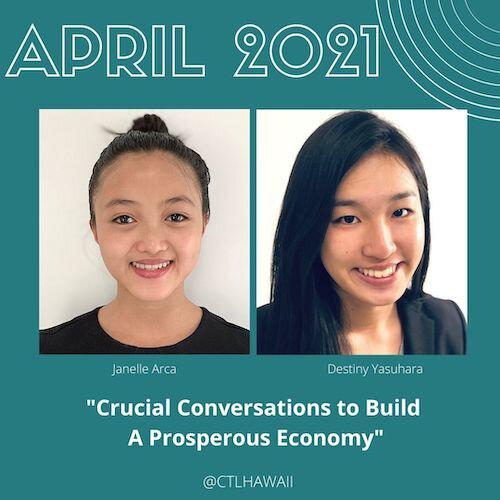Across the globe, countries have acted to address the crisis of cellphone use in schools. From school districts in California to nations such as South Korea, many school systems recognize the harm that unchecked screen use poses to student engagement and learning. In contrast, Hawaiʻi doesn't have a consistent statewide phone policy.
The following editorial was originally published in the Honolulu Star-Advertiser on Sunday, April 4, 2021 as part of the "Raise Your Hand" column in the Insights section.
By: Janelle Arca, Waianae High School (Class of 2021) and Destiny Yasuhara, Christian Academy (Class of 2022)

Struggle to survive in the beautiful paradise you grew up in, or move away for more affordable housing and a better paying job? Which would you choose? Many local people actively weigh these exact tradeoffs of living in Hawaii, and many choose to do what they think best for themselves and their families: to move elsewhere. However, people who move add to an ongoing problem - the number of people migrating is greater than the number of people immigrating to the islands, leaving important jobs in Hawaii vacant. Hawaii needs people to fill these jobs so that we can foster an innovative society that will help to tackle the problems we are currently facing.
Hawaii’s population has been declining ever since 2017. According to UHERO researchers, “The Mainland has become a more attractive place to live for many Hawaii residents, while Hawaii has become less attractive for potential Mainland in-migrants.” This is alarming as approximately 70% of Hawaii’s economy is driven by consumer spending. With more people leaving and less people moving in, our government is losing money fast, a problem which has only been exacerbated by COVID-19 economic woes. This trend has created a troubling ripple effect - with the government having less funds to create more jobs and private businesses cutting positions, many people are leaving Hawaii, leaving behind a dying economy.
“As the rising generation set
to inherit this challenge,
we want to be a part
of the solution.”
While certainly worrying, Hawaii’s economic troubles are nothing new. As the rising generation set to inherit this challenge, we want to be a part of the solution. We believe it is important for there to be more intergenerational conversation about Hawaii’s future workforce. Both sides have something important to share. The youth need to hear business professionals share their heart for Hawaii and the role the youth have in its future. Business professionals should hear what drives the younger generation to reach their definition of success, so they can equip them with opportunities and advice that will allow them to reach their goals locally. We advocate for these kinds of conversations because without them, there would be less focus on how to prepare the next generation to take care of the islands we are responsible for. The exodus of another generation of local people would just continue.
We need to invest in Hawaii - not just economically, but in the youth who will soon become the majority of the workforce. Our families and future depend on it. How else do we hope that our future generations will grow up in a place that is still the Hawaii we know today? We cannot keep hiring people from the mainland to fill our vacant job opportunities. Instead, we need to raise up local leaders and workers who will find solutions and will have the guts to run with them so that Hawaii can flourish. By having conversations between the generations of workers, we will be able to spread awareness about the opportunities that Hawaii has to offer and can start filling vacant jobs with people from Hawaii who want to be here.
This is, of course, no small task. It will not be accomplished overnight, and we need to rally local people of all walks around this shared vision of cultivating and preparing the future generation to preserve, yet grow Hawaii to its fullest potential. We need to maintain the beauty and the culture of this island, while still seeking to provide more opportunities to our future generations by creating solutions through crucial conversations.
Related Articles
When people talk about the dangers of artificial intelligence, many imagine their jobs and decisions taken fromthem by machines. But the more immediate danger looks very different — that we are instead willingly surrendering to AI. The danger of artificial intelligence is not that machines may become conscious, but that people may gradually surrender skills that require independence, patience, soul and critical thinking.
For decades, the concept of patriarchy has defined our social and political discourse, framing the
world as one where men inherently hold the advantage and women are systemically disadvantaged. This narrative, which has played a powerful role in achieving gender equity, remains deeply entrenched in public consciousness.
Amid the relative quietness of Hawaii’s political landscape, the most consequential election of this year is one over 5,000 miles away: the New York City mayoral race. It’s a three-man race among Democrat Zohran Mamdani, Republican Curtis Sliwa and former New York Gov. Andrew Cuomo who is running as an independent.
